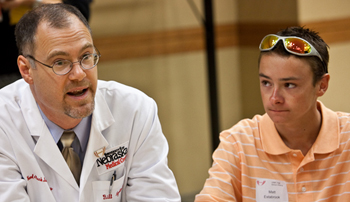Bill Lydiatt, M.D., has taken on a new challenge.
Already a soldier in the fight against head and neck cancer and an ardent proponent of mixing the arts and humanities with medical education — the professor of otolaryngology-head and neck surgery now teaches high school. Well, sort of.
Dr. Lydiatt teaches medical decision making to the 36 teenagers who now take classes at the medical center as part of the UNMC High School Alliance.
 |
Bill Lydiatt, M.D., chats with UNMC High School Alliance scholars while Matt Estabrook looks on. Estabrook and 35 other students from Omaha-area high schools are taking classes at UNMC this fall as part of the alliance. |
Below, Dr. Lydiatt talks about the course, the alliance and the difference between teaching high schoolers and medical students.
What topics will you cover in your course, Medical Decision Making?
We will discuss how health care decisions are made from multiple perspectives including the patient, the care givers, the family and society. Using clinical examples as well as literature, movies and art, we’ll see:
- How people in similar situations reach different conclusions;
- How data is collected to help health care professionals make decisions; and
- How decisions are made in clinical situations.
Why did you participate in the alliance?
I feel very strongly that an informed patient is the best solution to some of our most pressing problems in health care. Educating students at a young age will help them to better appreciate the difficulties they and their friends and family may have as they move through the health care system. Also, I hope that some of the students will learn if they are suited for a career in health care.
What do you look forward to in terms of working with high school students?
Enthusiasm, critical questions and helping them gain a better understanding of what they are thinking with respect to health care decision making.
How do you think teaching them will differ from the medical students you usually teach?
They will likely come with a broader set of interests. They will not be as educated or as mature but I expect will make up for that with enthusiasm and wonder.